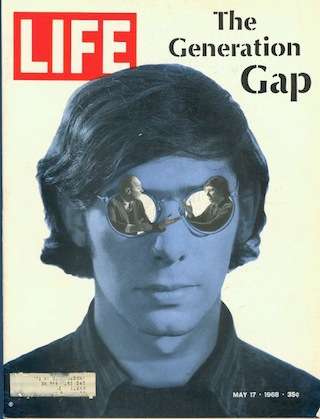The Generation Gap

A trope commonly from the period in which it was named, the 1960s. The Generation Gap is the idea that the psychological differences between the World War II generation and the Baby Boomers were so significant that they were incapable of understanding each other, and so were in conflict, often devolving into Kids Versus Adults. This mostly occurred because, at the time, the US was losing a lot of its British cultural baggage (thanks in no small part to the birth of Rock N' Roll). Specifically, the country was no longer looking to the royalty or high society for its influence and was instead looking to the rebels and non-conformists. Many World War II era adults disapproved of this (as did many Moral Guardians), so the generational gap became a widespread phenomenon.
Today, however, the generational gap is much less prevalent. And, fortunately, the media finally seems to have caught up with this.
Seems to be very common in 1960s and 1970s science fiction; see Films of the 1960s and Films of the 1970s. However, it also continued well into 80's/90's family sitcoms (even though the trope was beginning to die around that time).
Film
- Planet of the Apes has some offhand comments from the younger ape about "adults... always ordering you about".
- Logan's Run has the youths living in a derelict part of the complex, attacking the adults.
- Charly, the movie version of Flowers for Algernon, has a sequence where Charly rejects society and goes living a freelovin' lifestyle.
- Rebel Without a Cause
- A Clockwork Orange
Literature
- The Catcher in The Rye is a pre-gap example. Holden is disgusted with the superficiality (ie "phoniness") of the World War 2 generation and decides to embark on a life of rough living and debauchery.
- Older Than You Think: Consider this passage from the F. Scott Fitzgerald story "Bernice Bobs Her Hair", written in 1920:
"Heavens, yes! What modern girl could live like those inane females?"
"They were the models for our mothers."
Marjorie laughed.
"Yes, they were--not! Besides, our mothers were all very well in their way, but they know very little about their daughters' problems."
- The Full Matilda, which partially takes place in The Sixties, shows this between Matilda and her nephews David and Rodrick. Matilda is an old-fashioned black woman of the World War II generation, David is a hip baby boomer involved in the Civil Rights Movement, and Rodrick falls in love with a white woman.
Live-Action TV
- In The Quatermass Conclusion it turns out that The Generation Gap is caused by the malign influence of aliens. Of course.
- The Monkees TV show was undeniably symbolic of this trope. At the time, it was radical to even think about placing youth rebellion (with no parental figures) as protagonists on a prime time sitcom. However, the show attempted to create an understanding between the gap, and prove that America's youth wasn't all what it seemed, despite outside appearances. Their groovy theme tune (written by Tommy Boyce and Bobby Hart) says it all:
Here we come, walkin' down the street. We get the funniest looks from everyone we meet...
Hey, hey, we're the Monkees, and people say we monkey around. But we're too busy singin' to put anybody down.
We're just tryin' to be friendly, come and watch us sing and play. We're the young generation, and we've got somethin' to say.
- Family Ties is The Generation Gap after the generation that caused the first Gap... The hippy parents now have a conservative, money-obsessed son.
- Freaks and Geeks exemplifies The Generation Gap in its late stages. The Weir parents are clearly pre-Boomers, while the Weir kids are early Generation-X'ers. Needless to say, when it comes to issues like sex and drug use, the Weir parents are little (if any) help.
- And let's not forget Mr. Weir's blind bitterness towards The Sex Pistols!
Music
- Cat Stevens' song "Father and Son".
New Media
- In the Global Guardians PBEM Universe, the heroes of past decades sometimes have very different attitudes toward crime and crime-fighting than the younger crime-fighters. The heroes who are still active from the 40s and 50s, for example, tend to hold a black-and-white view of morality and are much more conservative than the ones who were born in the 80s.
Western Animation
- A rather pathetic example of this is the 2004 Larry Doyle directed Looney Tunes short "My Generation G-G-Gap," which not only came out when the concept of the "Generational Gap" was, for all intents and purposes, a dying trope, but portrayed teenagers as still listening to glam-influenced heavy metal.